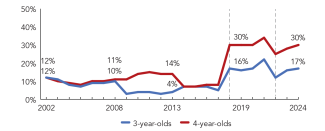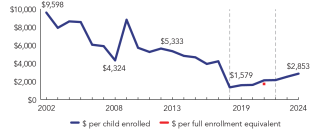
State of Preschool
Massachusetts
Access Rankings
Resource Rankings
Total Benchmarks Met
Overview

During the 2023-2024 school year, Massachusetts preschool programs enrolled 35,154 children in 2023-2024, an increase of 2,090 children from the prior year. State spending totaled $100,292,048, up $17,227,034 (21%), adjusted for inflation, since last year. State spending per child equaled $2,853 in 2023-2024, up $341 from 2022-2023, adjusted for inflation. Massachusetts met an average of 6 of 10 quality standards benchmarks.
Changes in the preschool programs operated by the Department of Early Education and Care in 2018 and 2022 are noted by vertical lines on the above enrollment and spending figures.
What's New

In 2023-2024, the Massachusetts Department of Early Education and Care (EEC) received additional funding from the state to add more grantees to the Commonwealth Preschool Partnerships Initiative (CPPI) funding to further expand access for 3- and 4-year-olds in 12 communities.
For FY 2024, the state legislature also made a commitment to continue providing stabilization grants to all EEC-licensed and funded providers, including the majority of CPPI programs, using state funds now that federal ARPA funds have been fully expended, allocating $475 million for the state’s Commonwealth Cares for Children (C3) Operational Grants for early education and care providers. Additional funds were also included in the budget to support increased access to mental health supports with a focus on trauma informed care for both children and families.
Background
In 2005, Massachusetts established the Department of Early Education and Care (EEC) and since then has supported access to high-quality preschool through multiple grant programs. These include a Universal Pre-Kindergarten (UPK) grant to support quality, affordability, and accessibility available to licensed programs serving 3- and 4-year-olds until 2019. The Inclusive Preschool Learning Environments (IPLE) Grant was also available to programs until 2019 and was designed to support access for preschool-age children with and without disabilities to high quality, inclusive early education and care settings. These programs are no longer included in the report.
In 2019, EEC launched its Commonwealth Preschool Partnerships Initiative (CPPI), which supports high quality preschool access for children from age 3 until they reach the locally determined kindergarten eligibility age. State funding is awarded directly to public school districts that serve as the fiscal and programmatic managers of the grant. Funded school districts are required to subcontract with community-based early education and care programs from their communities to implement the grant requirements, providing preschool access across public and private classrooms.
Massachusetts also supports preschool enrollment through the Chapter 70 funding stream, which is the state’s funding formula for PK–12 public schools. For the 2023-2024 school year, $179.5 million in combined state and local funding supported preschool-age children. All children in the state are eligible for the program and are served in public school settings, but local districts can set their own eligibility priorities. Lead teachers are required to have at least a bachelor’s degree and a Preschool through Grade 2 license.
-
Access

Total state pre-K enrollment 35,154 Special education enrollment, ages 3 and 4 11,948 Federally funded Head Start enrollment, ages 3 and 4 7,800 State-funded Head Start enrollment, ages 3 and 4 0 Resources
Total state pre-K spending $100,292,048 State Head Start spending $17,500,000 State spending per child enrolled $2,853 All reported spending per child enrolled* $6,033 
*Pre-K programs may receive additional funds from federal or local sources that are not included in this figure. †Head Start per-child spending includes funding only for 3- and 4-year-olds. ‡K–12 expenditures include capital spending as well as current operating expenditures.
-
Access
Resources
Total state pre-K spending $15,552,618 Local match required? No State Head Start spending $17,500,000 State spending per child enrolled $5,258 All reported spending per child enrolled* $11,013 
*Pre-K programs may receive additional funds from federal or local sources that are not included in this figure. †Head Start per-child spending includes funding only for 3- and 4-year-olds. ‡K–12 expenditures include capital spending as well as current operating expenditures.
Massachusetts Commonwealth Preschool Partnerships Initiative Quality Standards Checklist
| Policy | MA CPPI Requirement | Benchmark | Meets Benchmark? |
|---|---|---|---|
For more information about the benchmarks, see the Executive Summary and the Roadmap to State pages. | 6benchmarks met | ||
| Early Learning & Development Standards Benchmark | Comprehensive, aligned, supported, culturally sensitive | Comprehensive, aligned, supported, culturally sensitive | |
| Curriculum Supports Benchmark | Approval process & supports | Approval process & supports | |
| Teacher Degree Benchmark | BA (public); Other (nonpublic) | BA | |
| Teacher Specialized Training Benchmark | Pre-K - 2 (public); 9 college credits in ECE (nonpublic) | Specializing in pre-K | |
| Assistant Teacher Degree Benchmark | HSD | CDA or equivalent | |
| Staff Professional Development Benchmark | 20 hours/year; PD plans | For teachers & assistants: At least 15 hours/year; individual PD plans; coaching | |
| Maximum Class Size Benchmark | 20 (3- & 4-year-olds) | 20 or lower | |
| Staff to Child Ratio Benchmark | 1:10 (3- & 4-year-olds) | 1:10 or better | |
| Screening & Referral Benchmark | Developmental | Vision, hearing & health screenings; & referral | |
| Continuous Quality Improvement System Benchmark | Structured classroom observations; Data used for program improvement | Structured classroom observations; data used for program improvement | |
-
Access

Total state pre-K enrollment 32,196 School districts that offer state program 100% Income requirement No income requirement Minimum hours of operation Determined locally Operating schedule Determined locally Resources
Total state pre-K spending $84,739,430 Local match required? Yes State Head Start spending $17,500,000 State spending per child enrolled $2,632 All reported spending per child enrolled* $5,575 
*Pre-K programs may receive additional funds from federal or local sources that are not included in this figure. †Head Start per-child spending includes funding only for 3- and 4-year-olds. ‡K–12 expenditures include capital spending as well as current operating expenditures.
Massachusetts Chapter 70 Quality Standards Checklist
| Policy | MA Chapter 70 Requirement | Benchmark | Meets Benchmark? |
|---|---|---|---|
For more information about the benchmarks, see the Executive Summary and the Roadmap to State pages. | 6benchmarks met | ||
| Early Learning & Development Standards Benchmark | Comprehensive, aligned, supported, culturally sensitive | Comprehensive, aligned, supported, culturally sensitive | |
| Curriculum Supports Benchmark | Approval process & supports | Approval process & supports | |
| Teacher Degree Benchmark | BA | BA | |
| Teacher Specialized Training Benchmark | Pre-K - 2 | Specializing in pre-K | |
| Assistant Teacher Degree Benchmark | Determined locally | CDA or equivalent | |
| Staff Professional Development Benchmark | 150 Professional Development Points/5 years (teachers only); PD plans (teachers only) | For teachers & assistants: At least 15 hours/year; individual PD plans; coaching | |
| Maximum Class Size Benchmark | No limit (3- & 4-year-olds) | 20 or lower | |
| Staff to Child Ratio Benchmark | No limit (3- & 4-year-olds) | 1:10 or better | |
| Screening & Referral Benchmark | Vision, hearing, health & more | Vision, hearing & health screenings; & referral | |
| Continuous Quality Improvement System Benchmark | Structured classroom observations; Data used for program improvement | Structured classroom observations; data used for program improvement | |